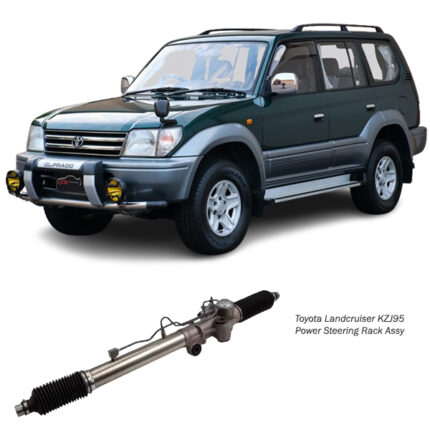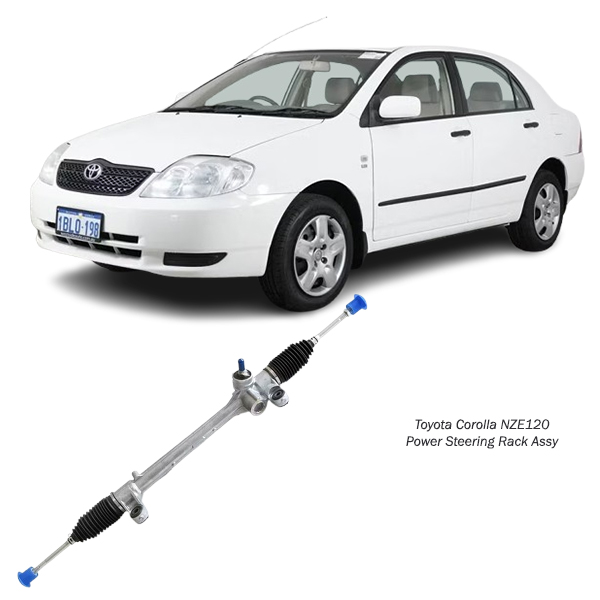-10%
Get Toyota Corolla NZE120 Power Steering Rack Assy 45510-12290 in Kenya
The power steering rack assembly is one of the most critical components in a vehicle’s steering system, allowing drivers to control the vehicle’s direction with minimal effort. By converting the rotational movement of the steering wheel into linear motion for the wheels, this assembly enhances the driver’s ability to maneuver the vehicle with precision and ease. This 1000-word guide explores the structure, function, benefits, maintenance, and troubleshooting of the power steering rack assembly.
What is a Power Steering Rack Assembly?
The power steering rack assembly is a central part of the power-assisted steering system. It connects the steering wheel to the wheels, providing a mechanical link between the driver and the road while integrating hydraulic or electric assistance to reduce the physical effort required to steer.
Unlike manual steering racks, which rely solely on the driver’s strength, the power steering rack uses hydraulic or electric power to amplify the force applied to the steering wheel. This makes steering smoother, particularly at low speeds or when parking.
Components of a Power Steering Rack Assembly
A typical power steering rack assembly includes the following components:
- Steering Rack
The rack is a metal bar that moves side-to-side in response to the steering wheel’s rotation. It translates the rotational motion of the steering wheel into the linear motion required to turn the wheels. - Pinion Gear
The pinion gear is attached to the steering column and engages with the rack. As the steering wheel turns, the pinion gear rotates and moves the rack laterally. - Hydraulic Cylinder
In hydraulic power steering systems, the cylinder contains fluid that assists the movement of the rack. The cylinder has two chambers, each pressurized by fluid depending on the direction of the turn. - Tie Rods
Tie rods connect the ends of the steering rack to the steering knuckles, which are part of the wheel assembly. They transmit motion from the rack to the wheels. - Power Steering Pump (for Hydraulic Systems)
The pump generates the hydraulic pressure necessary for the power steering system to function. It delivers fluid to the hydraulic cylinder through a series of hoses. - Electronic Control Unit (for Electric Systems)
In electric power steering systems, the ECU monitors the driver’s steering input and adjusts the level of assistance provided by the motor. - Seals and Boots
These protect the internal components of the steering rack from contaminants such as dirt, water, and debris, which can cause wear and reduce efficiency.
How the Power Steering Rack Assembly Works
The power steering rack assembly works by using hydraulic or electric power to amplify the driver’s input at the steering wheel.
- Hydraulic Power Steering
- When the driver turns the steering wheel, the pinion gear rotates and moves the steering rack.
- Sensors detect the steering input and send signals to the hydraulic pump, which directs pressurized fluid to one side of the hydraulic cylinder.
- The fluid pressure assists in moving the rack, reducing the effort required to turn the wheels.
- Electric Power Steering
- An electric motor replaces the hydraulic pump. Sensors detect the driver’s steering input and send data to the ECU.
- The ECU calculates the necessary assistance and activates the motor, which applies force to the steering rack to help turn the wheels.
Benefits of a Power Steering Rack Assembly
- Enhanced Driving Comfort
The power steering system reduces the physical effort required to steer, making driving less tiring, especially during long journeys or in stop-and-go traffic. - Improved Maneuverability
The power steering rack assembly makes low-speed maneuvers, such as parking or making tight turns, much easier by amplifying the steering input. - Greater Precision
Power steering systems provide better control and responsiveness, ensuring that the vehicle reacts accurately to the driver’s input. - Increased Safety
By making the vehicle easier to steer in emergencies or challenging conditions, the power steering rack assembly contributes to overall road safety. - Fuel Efficiency (in Modern Systems)
Electric power steering systems are more efficient than hydraulic systems, as they only use energy when assistance is needed, reducing fuel consumption.
Maintenance of a Power Steering Rack Assembly
Regular maintenance of the power steering rack assembly is essential to ensure its longevity and performance. Here are some key practices:
- Check Power Steering Fluid (Hydraulic Systems)
- Inspect the fluid level and top it up if necessary. Low fluid levels can cause steering stiffness and damage the pump.
- Replace the fluid according to the manufacturer’s recommendations to prevent contamination and maintain system efficiency.
- Inspect for Leaks
- Check for leaks around the seals, hoses, and connections. Leaks can lead to a loss of hydraulic pressure, making steering difficult.
- Inspect Boots and Seals
- Ensure the rubber boots and seals are intact to prevent dirt and moisture from entering the system. Replace any damaged components immediately.
- Wheel Alignment
- Misaligned wheels can cause uneven wear on the steering rack and tie rods. Regular wheel alignment checks can prevent premature wear.
- Monitor Electric Components
- For electric power steering systems, ensure the sensors, ECU, and motor are functioning correctly. A diagnostic scan can help detect any faults.
Common Issues and Troubleshooting
- Steering Stiffness
- Cause: Low hydraulic fluid, pump failure, or damaged rack.
- Solution: Check and top up fluid, inspect the pump, and replace worn components.
- Noisy Steering
- Cause: Air in the hydraulic lines, worn pinion gear, or faulty motor.
- Solution: Bleed the system, lubricate components, or replace the motor.
- Fluid Leaks
- Cause: Damaged seals or hoses.
- Solution: Identify the source of the leak and replace the faulty components.
- Uneven Tire Wear
- Cause: Misaligned steering rack or worn tie rods.
- Solution: Perform a wheel alignment and replace damaged tie rods.
- Steering Wheel Vibration
- Cause: Loose or worn rack assembly components.
- Solution: Inspect and tighten or replace the affected parts.
Replacement of the Power Steering Rack Assembly
When the power steering rack assembly becomes too worn or damaged for repair, replacement is necessary. This involves:
- Lifting the Vehicle
Use a jack and jack stands to raise the vehicle, providing access to the steering assembly. - Disconnecting the Components
Remove the tie rods, hydraulic lines, and electrical connections. Mark their positions for easier reinstallation. - Removing the Old Rack
Detach the steering rack from the chassis and slide it out carefully. - Installing the New Rack
Position the new rack and secure it to the chassis. Reconnect the tie rods, hydraulic lines, and electrical components. - Bleeding the System (Hydraulic Systems)
Remove air from the hydraulic lines by turning the steering wheel lock-to-lock while adding fluid. - Testing the System
Check for smooth steering operation and ensure there are no leaks or abnormal noises.
Conclusion
The power steering rack assembly is an essential component that ensures effortless and precise steering. By understanding its structure, function, and maintenance needs, drivers can keep their vehicles safe and efficient. Regular inspections and timely repairs can prevent costly failures and ensure a smooth driving experience.
For reliable power steering rack assemblies and professional installation, visit OneStop Garage & Auto Spares. We offer high-quality components and expert services to keep your vehicle running smoothly!
Follow us on Facebook for more parts.



